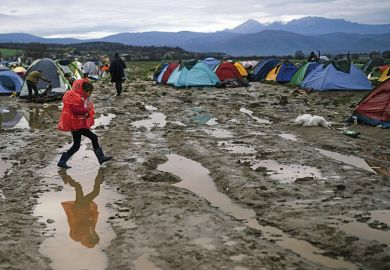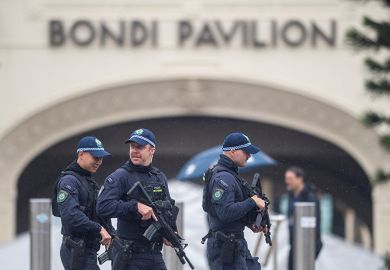In a world seemingly consumed by growing intolerance, a university in the middle of its most historically divided region is hoping to show a way forward.
The American University of Beirut, for much of its recent history, was a place where parents expected their children to graduate from and then quickly leave – finding jobs outside Lebanon.
Now, said its president, Fadlo Khuri, it’s a place where class projects often involve refugee camps, graduates form companies with social service missions, and students from Hezbollah backgrounds can be found signing petitions in support of gay rights.
“We can no longer just educate – we have to change,” Professor Khuri, a Boston-born and Beirut-raised research oncologist, told a higher education conference at Brown University.
That may be a common declaration for a university leader in the West. It’s something else entirely for a university leader in Beirut, an ancient city with a modern reputation for political tolerance that’s often accompanied by great legal and physical risks.
Last Halloween, the Gender and Sexuality Club at the American University of Beirut cancelled a planned party after a top Sunni Muslim cleric, Sheikh Mohammed Rashid Qabbani, publicly condemned the idea.
But the club itself has persisted, as Lebanon and its citizens continue tackling legal and cultural attitudes that enable discrimination.
In fact, these days Professor Khuri appears more concerned about backsliding in the West – and the US in particular – in the form of language and behaviours that sanction intolerance.
“You always have to worry,” he told the Reinventing Higher Education conference at Brown, “when world figures have dropped any sense of decency or collegiality in their tweets and in other things”.
That leads students “to ask the very real question: ‘Gee, if the most powerful man in the world can just rip a dead man to shreds, why can't I attack my colleague who just insulted me?’” Professor Khuri said.
Events in the US are more than just symbolism for AUB, which has US accreditation and operates under a charter granted by the New York State Education Department. As such, Professor Khuri is closely following Trump administration attempts to weaken legal protections for victims of sexual assault.
“This is an issue of not enough debate on universities’ campuses – this is a real threat to equality,” he told the conference.
AUB students appear to be up to the political challenges they face, Professor Khuri said. Some 67 per cent of them vote in student elections, an unusually high percentage among universities, he said. And a campus innovation park includes a provision for participants to voluntarily give back a small share of earnings to those in need.
“The students feel the need to be different – they want to be the adults in the room,” Professor Khuri said. The goal of AUB, he said, was “not just get a job or get into a great graduate school – our kids do that – but it’s to drive positive change and sustainable change in society”.
Register to continue
Why register?
- Registration is free and only takes a moment
- Once registered, you can read 3 articles a month
- Sign up for our newsletter
Subscribe
Or subscribe for unlimited access to:
- Unlimited access to news, views, insights & reviews
- Digital editions
- Digital access to THE’s university and college rankings analysis
Already registered or a current subscriber?








